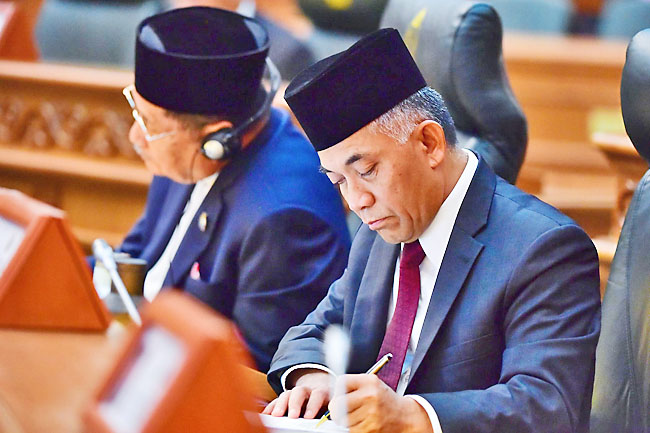Danial Norjidi
The topics of imports and Halal certification were among those put forward during the 17th Legislative Council (LegCo) session yesterday.
Responding to a question from LegCo member Yang Berhormat Haji Tahamit bin Haji Nudin pertaining to the import of meat into Brunei Darussalam, Minister of Primary Resources and Tourism Yang Berhormat Dato Seri Setia Awang Haji Ali bin Apong highlighted that the Ministry of Primary Resources and Tourism (MPRT) is inclined towards increasing the country’s output for export and to reduce imports.
“However, we as a small country are not able to produce all that is required and therefore there is a lot that we import, especially products that cannot be grown here such as apples and strawberries,” said the minister.
“With regard to the import of vegetables, meat and others, there are regulations where the ministry continuously liaises with the authorities of countries whereby before the respective country exports goods to Brunei Darussalam, the authorities must first certify that the goods are fit to be exported abroad, and indeed the MPRT will contact the relevant ports to ensure it is safe to import into the Sultanate,” he added.
As an example, he said, with regards to meat, the ministry will liaise with authorities in Australia, Malaysia or elsewhere to ensure their farms are clean and free from diseases that could affect consumers.
“For other goods we will continue to work with domestic entrepreneurs, for example in crop goods, to ensure that the imported goods will be replaced by national production.”
The minister also noted that the import of meat requires Halal certification from the Brunei Islamic Religious Council (MUIB).


He said there are two aspects necessary to ensure the meat is suitable for import. One is in terms of biosecurity which is handled by the MPRT, while the Halal aspect is handled by MUIB.
Minister of Religious Affairs Yang Berhormat Pehin Udana Khatib Dato Paduka Seri Setia Ustaz Haji Awang Badaruddin bin Pengarah Dato Paduka Haji Awang Othman said the country has laws that regulate meat that is imported or that is from within the country, so that it is certified.
Regarding the MUIB certification for imported meat, the minister explained that first of all, the slaughterhouse must be inspected and audited to ensure its safety aspects and eligibility as a Halal meat producer.
“Among them is to ensure the qualification of the one who will slaughter, not the qualification in terms of operating the machine, but the qualification as a Muslim which is in line with the religious practices of our people here.”
The second step is certification. “So our importing companies can apply to MUIB to import meat from the relevant centres and the permission for import in terms of quotas and so on is on the part of the MPRT to determine.”
“The company is then required to bring two inspectors who will determine whether the slaughter method is correct, that the packaging for export is correct, and to ensure that there is a seal or is approved by the inspector. Upon exporting to our port, the container is checked again and assessed on whether the seal is still intact to ensure it is not contaminated.
“It is not an easy process to get imports from abroad. So far, several slaughterhouses in Australia and Malaysia have been certified,” he said.
The minister said the inspection procedure is enforced by MUIB regulations, adding, “In the future, it will be dynamic. Because of our recent experience, we cannot send inspectors there to a recognised centre, so we are represented by our embassies/high commissions and officials appointed through virtual training. They can then also get guidance from Muslim societies or Islamic councils in those places to carry out the duties of inspectors that are usually brought from Brunei.
Expanding further on Halal certification, the minister said, “Of course, at this time there is thought towards raising the integrity of the Halal certification so that it can contribute to the national economy, as has been attained by some countries close to us, whereby the Halal certification can contribute to the economic generation of their respective countries.”
“We are confident because our Halal is a very valuable brand. Many overseas want to use it,” added the minister. “At this time we are in the stage to assess how things like this can be done appropriately, not only in terms of Halal from the aspect of religion but also Halal in the aspect of an industry,” he said.